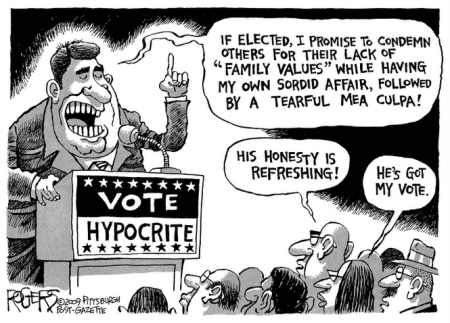
This blog is devoted to developing, discussing, and promoting a plainer and more Saxon English, an English with fewer non-native linguistic features, an English which maximises the potential of native forms. However, you may have noticed that this blog is also riddled with non-native forms — such as in the previous sentence!
The ancient Greek philosopher Epicurus said the following (although he said it in Greek, of course): Your discourse will appear more impressive, believe you me, if [it is lived] … For it will not only be uttered, then, but proven.*
Or, to put it another way: “practise what you preach”. Show you mean business. After all, why should anyone take Anglish seriously if I don’t appear to take it seriously myself?
So why do I, apparently, refuse to practise what I preach? Why is my blog, dedicated as it is to Saxon English a.k.a. “Anglish”, full of its very antithesis: foreign-laden English, a.k.a. Standard English or “Englandish”? Why am I, in short, an apparent hypocrite? Surely it’s because I have no real faith in what I preach and I am therefore merely wasting time amongst men who don’t appreciate it (Epicurus again).
Far from it!
Basically it comes down to this: I either write in pure Anglish, and thereby potentially alienate prospective readers by a thick, dense, jargon (albeit a Germanic one), or I write in Standard English and in so doing, not erect an initial barrier to my message. So I go down the second route. My choice, frankly, is to try to lace my writings with Anglish. Sometimes, I will draw attention to such forms, and sometimes I will try to smuggle such forms in. Why? Well, at times it is helpful to flag up what you are doing and thus show how elegant true English forms can be. And at other times, it’s better to smuggle an Anglish form in so that people, perhaps only later or when it is pointed out to them, realise that this word is not, in fact, standard at all, but is in fact Anglish. This smuggling in shows that these word-forms work just as well.
But here’s the key.
Whether I’m using a word and flagging it up as Anglish, or whether I’m trying to smuggle an Anglish word in, I cannot deliberately unbalance my piece of writing by restricting my English unnaturally or by stilting it through overuse of Anglish. Also note that many Anglish words are ideas which may or may not actually work out. Anglish is a work in constant progress. And so if I go gungho into Anglish, in terms of the style I write these blog entries in, then I risk risible, unintelligible, Germanising or Germanicising English — something which I wish to stay away from. And also note that even well-chosen Anglish words, when used in mass, have the effect of drawing attention to themselves — something I often try to get away from.
So I don’t think I’m guilty of hypocrisy when I write in more-or-less Standard English. But I also don’t think all Anglishers should follow my lead, either: it’s good to have a mix of articles, some written in Standard English, some in Anglish.
Afterthought: An Anglish word for “hypocrite”?
Before I go, let’s think about the word “hypocrisy” itself. It basically means ‘doing the opposite of what you yourself say to do’. It’s therefore quite difficult to phraseword this notion. It’s also got a somewhat convoluted meaning-history, and so isn’t that easy to loan translate either. The meaning of this Greek word shifted over time from ‘separate gradually’, to ‘answer’, to ‘answer a fellow actor on stage’, to ‘play a part’.
So is it possible to come up with an Anglish form for “hypocrisy” and “hypocrite”? The other Germanic languages can help us out.
In German, we have Heuchler and Scheinheilige, which respectively are related to the root of “huckster” and the words “shine holy“. Swedish has hycklare, also related to the root in “huckster”. In Dutch, you say hypocriet, huichlaar, and schijnheilige.
Bearing all this in mind, we might wish to replace “hypocrite” with something like “huckler” from a new verb “to huckle”. This would certainly follow the Germanic model. And whilst I think this word words very well, it is newly minted and is therefore pushing the envelope a bit. How about the other Germanic path: “shineholy”? Again, I think this works quite well; indeed, it’s pretty elegant. But is it crystal clear? Not really, although it is rather evocative. But then again, was “foreskin” completely see-through when it effectively replaced “prepuce”? Yet the evocative “foreskin” caught on. I also like the notion of being holier-than-thou which is alluded to in forms such as Scheinheilige; those who protest their holiness are often hypocrites. Perhaps, therefore, “show-holy” — that is, holy for show, but not in reality.
Huckler. Showholy or For-show holy. What do you think?
Footnote:
*I’ve slightly paraphrased him here in order to make what he said make more sense for the context at hand.
featured image from http://standupforamerica.files.wordpress.com/2009/10/vote-hypocrite.jpg
© 2014 Bryan A. J. Parry
Bryan, what are your thoughts on the word ‘faker?’ It’s a popular word right now, but holds a shame like ‘hypocrite,’ and has a history of use in the English language.
Hi there, Micah. I don’t know that “faker” is a completely perfect fit for “hypocrite”, but it’s not a million miles away. It’s very close indeed.